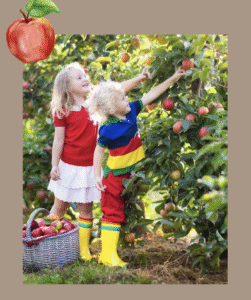Harvest Season Learning: How to Turn Apple Picking into a Math & Science Lesson

Fall weekends offer the perfect opportunity to combine family fun with natural learning experiences. Apple picking isn’t just a delightful autumn tradition—it’s also an engaging way to teach children through a learning adventure without them even realizing they’re absorbing new concepts.
Orchards provide hands-on learning environments where children can observe, question, and discover. Children naturally engage with math and science concepts when they’re surrounded by trees, examining fruit, and making real-world decisions.
Math Lessons Among the Apple Trees
Apple picking naturally introduces mathematical thinking in ways that feel like play rather than work.
Counting and Skip Counting As children pick apples, encourage them to count their harvest. Younger children can practice one-to-one counting, while older kids can group apples by fives or tens for skip counting practice. Ask questions like, “If you have 3 apples and pick 4 more, how many do you have now?”
Comparing and Measuring Children can compare apples by size, weight, and color. Which apple is bigger? Can they find the smallest one? If your orchard provides scales, let them weigh their bag and calculate how many pounds they’ve collected. This introduces concepts of measurement and estimation.
Money and Addition Most orchards charge by the pound or bag. This creates perfect opportunities to discuss pricing, addition, and even making change. Let older children calculate the cost of your apples or figure out how many bags you can buy with a specific budget.
Science Discovery in Every Branch
Beyond mathematics, orchards offer rich opportunities for scientific observation and inquiry. Every visit becomes a learning adventure when children explore the natural world around them.
Life Cycles and Seasons Discuss how apples grow from blossoms in spring to fruit in fall. Children can observe different stages of growth on the same tree, noting how some apples are fully ripe while others are still developing. This introduces concepts of plant life cycles and seasonal changes.
Observation Skills Encourage children to examine apples closely. What colors do they see? Are all apples perfectly round? Why do some have spots or blemishes? These observations develop scientific thinking and attention to detail. Furthermore, children can compare different apple varieties, noting differences in appearance, texture, and even smell.
Cause and Effect Discuss why apples fall from trees and what makes them ripe. Talk about the role of sun, rain, and soil in growing healthy fruit. These conversations introduce basic concepts of plant biology and environmental science.
Planning Your Perfect Learning Adventure
Looking for the perfect spot to start your learning adventure? The Boston area offers wonderful family-friendly orchards:
- Honey Pot Hill Orchards (Stow)
- Parlee Farms (Tyngsborough)
- Smolak Farms (North Andover)
- Brooksby Farm (Peabody)
- Connors Farm (Danvers)
Ready to put your apple harvest to delicious use? Try these simple fall apple recipes that kids can make. It’s the perfect way to extend your orchard adventure into the kitchen and teach even more skills through cooking.
At Delphi Academy of Boston, we believe learning happens everywhere—not just within classroom walls. Our hands-on, individualized approach recognizes that children develop strong academic foundations through real-world experiences and natural curiosity. Learn more about our educational philosophy.
